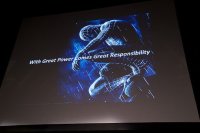Gaming for Social Good
Your content has been saved!
Go to My Saved Content.Over the years, many video games with social themes have been developed. In 2005, the United Nations World Food Programme released Food Force. Food Force was a downloadable game, developed by game publisher Konami, in which players delivered food to people in need. Another game for social change was MTV's Darfur Is Dying. Released in 2006, this online game put players in the role of a refugee in civil war-torn Darfur.
In my social studies classroom, I have implemented games with social themes, including Ayiti: The Cost of Life, a role-playing game set in Haiti, and the poverty simulation games Heifer Village and 3rd World Farmer. But can playing video games really change the world for the better?
The Social Good
The social media news site Mashable defines social good as the "intersection of technology and social change." Social good includes campaigns that raise awareness and money through social media. One example is Epic Change, which crowdfunds from its online followers to finance projects like building schools in Tanzania. Each year, Mashable, along with organizations ranging from the United Nations to the Bill & Melinda Gates Foundation, sponsor the Social Good Summit. The summit's goal is to "leverage the power of technology and new media to make the world a better place."
Video games that focus on social change have become a fast-growing sector of the "edutainment" gaming sector. An excellent example of a social good project directly linked to gaming is the Half the Sky Movement. This project is based on a documentary that detailed women's oppression in developing countries. Relating to the Half the Sky Movement, the United States Agency for International Development (USAID) released three mobile games: the family-planning awareness titles Nine Minutes and Family Choices, and the digestive health game Worm Attacks. In the U.S., the Facebook game Half the Game was published to raise Americans' awareness of international women's rights. There is a published academic study on Half the Sky's positive social affects.
Games for Change
Nowhere is gaming for social good more evident than with the organization Games for Change (G4C). Their mission is simple: "Catalyzing social impact through digital games." Game categories include education, poverty, human rights, health, the environment and economics.
Since 2004, G4C has sponsored a festival in New York City. The purpose of the festival is bringing together game designers and educators to create engaging games that have a social impact. Previous keynote speakers have included Supreme Court Justice and iCivics founder Sandra Day O'Connor, former Vice President Al Gore, author and ISTE 2013 keynote speaker Jane McGonigal (who is also a G4C board member), and Valve Corporation (Half Life 2, Portals) founder and CEO Gabe Newell. At the 2012 G4C Festival, Valve announced Teach with Portals to bring their physics puzzler into the classroom. This past June 17-19 marked the 10th Anniversary Games for Change Festival at New World Stages in New York. Over 100,000 game designers, professionals and academics attended.
Quandary, from the Learning Games Network, won this year's "Game of the Year" award. Quandary is a free, online game that engages players in the ethical decision-making process of colonizing a new planet. Users can track their progress globally on the site's leaderboard. Teachers can access the Quandary in the Classroom page, which features lesson plans and links to Common Core Standards.
Including "Game of the Year," there were four major G4C Festival award categories. BlindSide, which won "Most Innovative" game, is a mobile thriller that "gives players the experience of living without sight as they hear their way through a danger-filled city." Meanwhile, Reach for the Sun, a life science game that puts the player in the role of a growing plant, won "Best Gameplay." In the final major category, Data Dealer was recognized as the game with the "Most Significant Impact." Data Dealer is a web-based game that raises awareness about online privacy concerns.
G4C also promotes social gaming. Playable as a Facebook app and similar to Farmville, WeTopia uses game currency called "joy," which can be exchanged to fund real-world children's charities. A new version of Food Force was also revived as a Facebook game.
Collaboration Superpowers
In the bestselling book Reality Is Broken: Why Games Make Us Better and How They Can Change the World, author Jane McGonigal states that games can "give us collaboration superpowers." It is becoming increasingly apparent that playing games together -- with a positive purpose -- can effect change for the better.
To review all of the G4C featured games, browse http://www.gamesforchange.org/play/.
